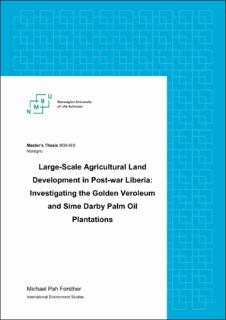Large-scale agricultural land development in post-war Liberia : investigating the Golden Veroleum and Sime Darby palm oil plantations
Master thesis
Permanent lenke
https://hdl.handle.net/11250/2652794Utgivelsesdato
2019Metadata
Vis full innførselSamlinger
Sammendrag
The present research examines the impact of the large-scale agricultural land developments in post-war Liberia, particularly investigating Sime Darby and Golden Veroleum palm plantations. Liberia experienced two civil wars, one from 1989 to 1996 and another from 1999 to 2003. And since the civil conflict ended in 2003, the country is slowly transforming into a peaceful democratic country that it once was. The nation’s development and means of dealing with its multitude of problems depends heavily on aids, loans and foreign direct investments from other countries. However, the country has its own tax regime and revenue generating mechanisms but they are dependent on the constant inflow of foreign investment to keep the entire nation a little bet above budgetary shortfall and economic hardship (Liberia National Investment Commission, 2016). Against these backdrops, two palm oil plantation companies called Sime Darby and Golden Veroleum were permitted Liberia. Sime Darby has it’s headquarters in Malaysia whereas Golden Veroleum has its headquarters in Indonesia. Golden Veroleum mainly operates in Sinoe County and Sime Darby operates in Cape Mount county. These two companies advocate that they have vowed to contribute to the development and economic growth of Liberia especially in communities where they have their agriculture plantations. However, local inhabitants, on the other hand, argued that they were not involved in the initial negotiations of the land deals between the government of Liberia and the management teams of these companies. In this regard, this paper attempts to examine the two investment entities, talk to major actors, local workers in the two agribusiness companies, and hear the narratives of local inhabitants within areas of these large-scale agricultural land development projects of Golden Veroleum and Sime Darby palm oil plantations respectively. Qualitative interviews were conducted and responses were coded thematically before analysis. The findings of the study revealed that promises given by the foreign investors to the local inhabitants about employment opportunities, compensations, development of infrastructural facilities were not met.

